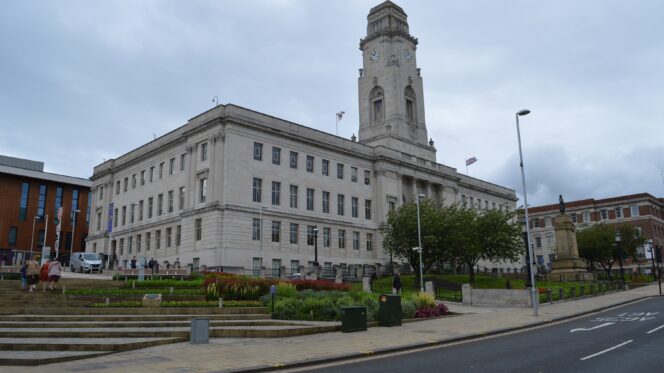Labour’s Migration Plans Will Embolden the Far Right

Labour’s manifesto launch last week was billed as deliberately boring. We were warned there would be no new policies and no surprises and indeed there weren’t, as the party attempts to project stability and serious politics over gimmicks. But when so much of our society is in crisis, is such caution really credible?
On migration the document is more defined by what isn’t said than by what is. By my count, the entire migration agenda is only about 520 words long, and while some of it will make things better, or at least stop making them worse, the plan looks insufficient to really address the problems.
Abandoning Rwanda.
On refugees, Labour promises to do what is legally the government’s job: processing asylum claims, instead of warehousing asylum seekers in hotels while hoping to deport them to Rwanda. Abandoning the Rwanda deportation plan, which has terrorised refugees, in favour of reopening the asylum system is a significant positive shift. Reforms like speeding up decision-making, returning to community-based asylum accommodation funded through local authorities, and addressing Home Office bureaucracy and incompetence could greatly reduce both the cost of the asylum system, and the suffering of the vulnerable people within it. However, the positive news ends there.
The manifesto emphasises a new asylum returns unit, diverting resources from improving systems to costly and often unworkable deportation efforts. Labour’s slogan “smash the gangs” replaces “stop the boats” but frankly, both are equally unlikely. While targeting smugglers rather than asylum seekers is a marginal rhetorical improvement, continuing a police-led border management approach has proven counterproductive.
Focusing on gangs rather than migrants is slightly smarter, as some smugglers could in theory be arrested and charged, which allows the government to point to an outcome that is at least partially within its control, which stopping the boats is not.
However, this must not happen at the expense of migrant lives: increased police controls in northern France have led to a 450% rise in deaths at our shared border this year, as migrants take riskier routes to avoid detection. Current anti-smuggler operations in the UK and across Europe also often arrest more migrants than actual criminals. Young and relatively poor asylum seekers are coerced into steering small boats in exchange for free passage, then apprehended as “captains” on arrival. If Labour’s crackdown on smugglers continues this trend, it will likely lead to more deaths and miscarriages of justice, without impacting smuggling gangs.
Crucially, the manifesto does not address how refugees may safely access our newly reopened asylum system. No more police operations can be justified if not accompanied by alternative means of travel for asylum seekers who need to come here. The evidence shows us, time and again, that the majority of people who seek asylum in the UK instead of elsewhere do so for good reason. The significant majority come from countries where the UK has a history of colonial intervention; many share our language; and very often, they are trying to join family and community here in the UK. While our European neighbours host more refugees and are safe havens for many, they often practise brutal anti-migrant measures that force some to continue their journeys. The UK cannot ignore our share of responsibility for addressing global displacement.
As long as the UK asylum system is accessible only through dangerous, irregular journeys, smuggling will thrive. Leading European cooperation to manage safe and orderly refugee arrivals is the only viable long-term solution.
Non-asylum immigration.
Labour’s non-asylum migration plans are even vaguer. The most substantial promise is to reduce net migration, an arbitrary concession to anti-migrant politics. Recent high immigration has been caused by specific factors: the post-pandemic bounce-back in foreign students, the Ukraine and Hong Kong schemes, and a new care workers’ visa.
Numbers are already decreasing, and further reductions are expected due to recent Tory restrictions. Applications for social care visas have dropped by 90% in recent months, and overseas student visas have significantly decreased too. Some say the Tories have gifted Labour a win with the likely steep drop in net immigration figures over the next six to 12 months, but this is a double-edged sword. A sudden reduction in migrant health and social care workers and students will have severe economic and social implications. NHS waiting lists will spiral as social care capacity drops, and universities will have to cut back places for British students. Labour’s promise to keep reducing immigration figures then will put them in a bind, leaving everyone to suffer the consequences.
Aside from the focus on numbers, there are reasons for cautious optimism. The manifesto promises desperately needed reform of the points-based immigration system. While details are scarce, a smart approach to overhauling the system and reorienting it towards one built around fair and equal rights could be transformative. The current system ties workers to their employers for their right to be in the country, exacerbating power imbalances and fuelling exploitation. Labour’s New Deal for Workers proposes changes to improve enforcement of workers’ rights and roll back anti-union legislation. Including migrant workers without discrimination and facilitating safe reporting of labour abuses separate from immigration enforcement could seriously start to address low pay and mistreatment in sectors reliant on a migrant workforce.
The manifesto is silent on managing other key areas of the immigration system, though. Nothing at all on family migration rights or on addressing the bureaucratic and financial obstacles that prevent settlement and citizenship. In a campaign increasingly influenced by racist and exclusionary anti-migrant discourse, Labour’s silence on supporting migrants in our communities, and improving race relations is a significant gap.
There are major positive changes that Labour could make to reduce precarity in the visa system. Policies like reducing the time migrants spend in a temporary status by providing a settlement pathway for all migrants after a maximum of five years, and reinstating birthright citizenship. Not only would this reduce precarity and the churn of short-term labour migration, it would also be felt especially by working-class migrants of colour who are overrepresented on the longer 10-year route to settlement, and often priced out by exorbitant fees.
Overall, there are clear positive differences between Labour and Tory approaches to immigration, with a change in government likely to end some of the worst policies. However, the rightwing anti-immigrant agenda is only growing, and Labour’s current plans do not go far enough to counter it. If boats continue arriving and investment in public services falls short, Farage and the Tory right will be rubbing their hands. We need more ambition to change the rhetoric and implement a humane migration system. The campaign for migrants’ rights will not end with defeating the Tories. We must address the underlying hostility towards migrants, or the next election could be fought on even more toxic ground.
Zoe Gardner is policy and research manager for the European Network on Statelessness.


